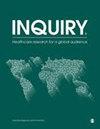Patient Autonomy in Medical Education: Navigating Ethical Challenges in the Age of Artificial Intelligence
IF 1.7
4区 医学
Q3 HEALTH CARE SCIENCES & SERVICES
Inquiry-The Journal of Health Care Organization Provision and Financing
Pub Date : 2024-09-18
DOI:10.1177/00469580241266364
引用次数: 0
Abstract
The increasing integration of Artificial Intelligence (AI) in the medical domain signifies a transformative era in healthcare, with promises of improved diagnostics, treatment, and patient outcomes. However, this rapid technological progress brings a concomitant surge in ethical challenges permeating medical education. This paper explores the crucial role of medical educators in adapting to these changes, ensuring that ethical education remains a central and adaptable component of medical curricula. Medical educators must evolve alongside AI’s advancements, becoming stewards of ethical consciousness in an era where algorithms and data-driven decision-making play pivotal roles in patient care. The traditional paradigm of medical education, rooted in foundational ethical principles, must adapt to incorporate the complex ethical considerations introduced by AI. This pedagogical approach fosters dynamic engagement, cultivating a profound ethical awareness among students. It empowers them to critically assess the ethical implications of AI applications in healthcare, including issues related to data privacy, informed consent, algorithmic biases, and technology-mediated patient care. Moreover, the interdisciplinary nature of AI’s ethical challenges necessitates collaboration with fields such as computer science, data ethics, law, and social sciences to provide a holistic understanding of the ethical landscape.医学教育中的患者自主权:驾驭人工智能时代的伦理挑战
人工智能(AI)越来越多地融入医疗领域,标志着医疗保健进入了一个变革时代,有望改善诊断、治疗和患者预后。然而,这种快速的技术进步同时也带来了渗透到医学教育中的伦理挑战。本文探讨了医学教育者在适应这些变化中的关键作用,确保伦理教育仍然是医学课程的核心和可适应的组成部分。医学教育工作者必须与人工智能的进步同步发展,在算法和数据驱动决策在患者护理中发挥关键作用的时代,成为伦理意识的管理者。根植于基本伦理原则的传统医学教育范式必须进行调整,以纳入人工智能带来的复杂伦理考量。这种教学方法促进了学生的动态参与,培养了他们深刻的伦理意识。它使学生有能力批判性地评估人工智能在医疗保健领域应用的伦理影响,包括与数据隐私、知情同意、算法偏见和以技术为媒介的患者护理相关的问题。此外,人工智能伦理挑战的跨学科性质要求与计算机科学、数据伦理、法律和社会科学等领域合作,以提供对伦理环境的整体理解。
本文章由计算机程序翻译,如有差异,请以英文原文为准。
求助全文
约1分钟内获得全文
求助全文
来源期刊
CiteScore
2.50
自引率
0.00%
发文量
192
审稿时长
>12 weeks
期刊介绍:
INQUIRY is a peer-reviewed open access journal whose msision is to to improve health by sharing research spanning health care, including public health, health services, and health policy.

 求助内容:
求助内容: 应助结果提醒方式:
应助结果提醒方式:


